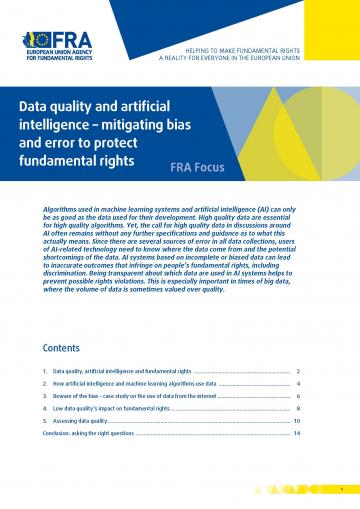Help us make the FRA website better for you!
Take part in a one-to-one session and help us improve the FRA website. It will take about 30 minutes of your time.

Data quality and artificial intelligence – mitigating bias and error to protect fundamental rights
Since there are several sources of error in all data collections, users of AI-related technology need to know where the data come from and the potential shortcomings of the data. AI systems based on incomplete or biased data can lead to inaccurate outcomes that infringe on people’s fundamental rights, including discrimination. Being transparent about which data are used in AI systems helps to prevent possible rights violations. This is especially important in times of big data, where the volume of data is sometimes valued over quality.
AI and big data continues to be a topic of high priority for policy, science, business and media throughout the world. Developments in the area are of high relevance, as new technologies impact on all spheres of life and hence also impact on fundamental rights. Ethical implications of AI are the topic of many discussions. At the same time, these discussions need to acknowledge that there is a human rights framework setting binding legal obligations around AI, which should be seen as a starting point for any evaluation of the opportunities and challenges brought by new technologies. The European Union’s strong fundamental rights framework, as enshrined in the Charter of Fundamental Rights and related case law, provides guidance for the development of guidelines and recommendations for the use of AI.
This paper sets out to contribute to the many ongoing policy discussions around AI and big data by highlighting one aspect that needs attention from a fundamental rights perspective; namely the awareness and avoidance of poor data quality. It does not aim at explaining how to use high quality data, but how to become aware of and avoid using low quality data.




